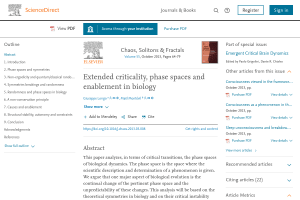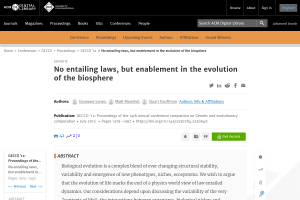
Extended criticality, phase spaces and enablement in biology
Chaos, Solitons & Fractals
Biological evolution entails continual changes of the pertinent phase space, leading to unpredictability. We discuss causality as enablement by constraints.
Abstract
This paper analyzes, in terms of critical transitions, the phase spaces of biological dynamics. The phase space is the space where the scientific description and determination of a phenomenon is given. We argue that one major aspect of biological evolution is the continual change of the pertinent phase space and the unpredictability of these changes. This analysis will be based on the theoretical symmetries in biology and on their critical instability along evolution. Our hypothesis deeply modifies the tools and concepts used in physical theorizing, when adapted to biology. In particular, we argue that causality has to be understood differently, and we discuss two notions to do so: differential causality and enablement. In this context constraints play a key role: on one side, they restrict possibilities, on the other, they enable biological systems to integrate changing constraints in their organization, by correlated variations, in un-prestatable ways. This corresponds to the formation of new phenotypes and organisms.
Keywords: Conservation properties, symmetries, biological causality, phase space, unpredictability, phylogenetic drift, enablement



